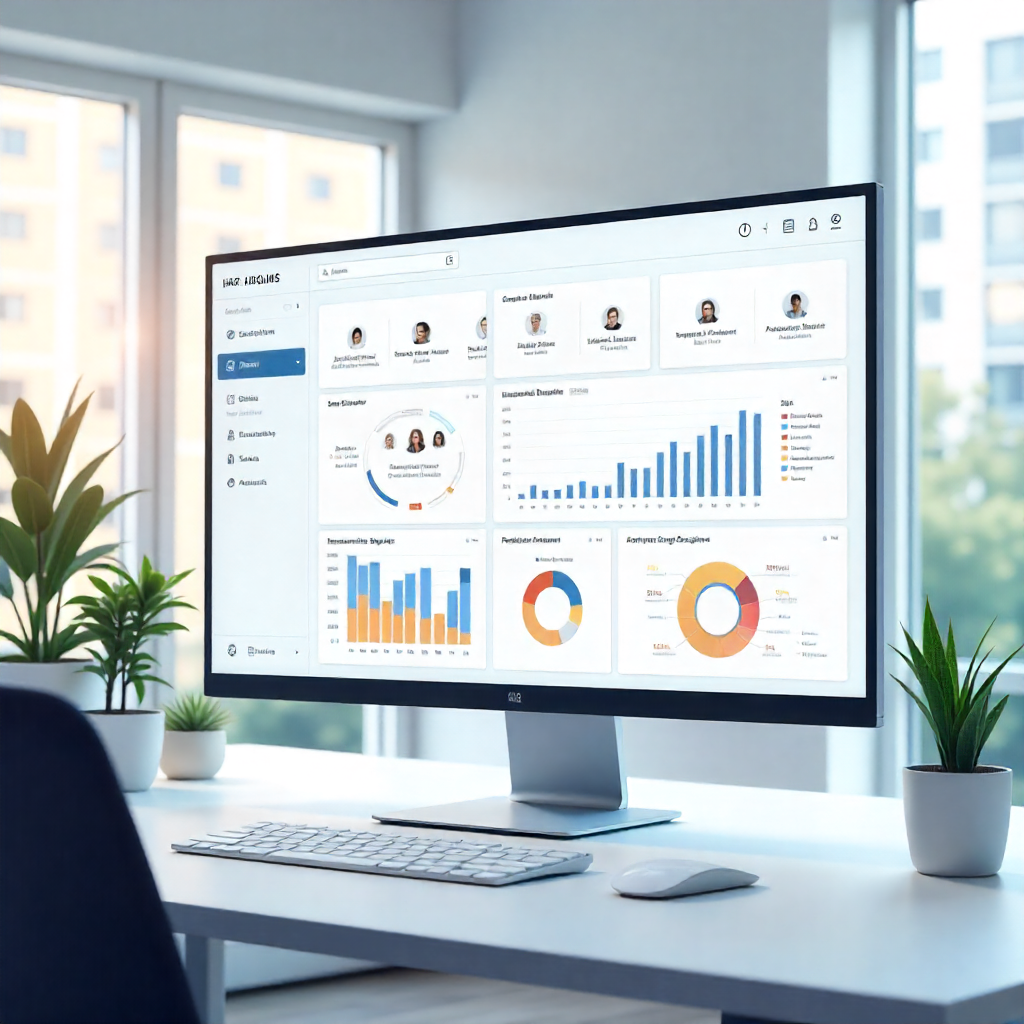What is HRMS?
Discover how Human Resource Management Systems revolutionize workforce management, streamline processes, and drive organizational success.

Understanding HRMS
What is an HRMS?
A Human Resource Management System (HRMS) is a comprehensive software solution that combines multiple HR functions into a single, integrated platform to streamline workforce management and enhance organizational efficiency.
Centralized Management
HRMS centralizes all employee data, processes, and workflows into one unified system, eliminating data silos and improving accessibility.
Process Automation
Automates routine HR tasks like payroll processing, leave management, and performance evaluations, reducing manual work and errors.
Data-Driven Insights
Provides analytics and reporting capabilities to help make informed decisions about workforce planning and HR strategies.
Reduction in HR Administrative Time
Improvement in Data Accuracy
Faster Employee Onboarding
Cost Savings on HR Operations
Core Features
Essential HRMS Modules
Modern HRMS platforms integrate multiple modules to create a comprehensive HR management ecosystem that handles every aspect of workforce management.
Employee Information Management
Centralized employee database with personal information, job history, documents, and organizational structure.
Payroll Processing
Automated salary calculations, tax deductions, compliance management, and payment processing.
Time & Attendance
Time tracking, shift scheduling, overtime management, and attendance monitoring with biometric integration.
Performance Management
Goal setting, performance reviews, appraisals, feedback systems, and career development planning.
Recruitment & Onboarding
Job posting, candidate tracking, interview management, and streamlined onboarding processes.
Training & Development
Learning management, skill tracking, certification management, and career development programs.
Leave Management
Leave applications, approval workflows, balance tracking, and holiday management.
Compliance & Reporting
Regulatory compliance, audit trails, custom reports, and analytics dashboards.
Integrated Module Benefits
When HRMS modules work together, they create powerful synergies that transform your HR operations.
Seamless Data Flow
Employee information automatically flows between modules, eliminating duplicate data entry and ensuring consistency.
Automated Workflows
Cross-module automation triggers actions across the system, like updating payroll when attendance is recorded.
Comprehensive Analytics
Unified reporting combines data from all modules to provide complete workforce insights and strategic planning.
Process Flow
How HRMS Works
Understanding the workflow and processes that make HRMS an essential tool for modern organizations, from data collection to strategic insights.
Data Collection
Centralize employee information from multiple sources into a unified database.
Process Automation
Automate routine HR tasks like payroll, leave approvals, and performance reviews.
Real-time Processing
Process transactions and updates in real-time across all integrated modules.
Analytics & Reporting
Generate insights and reports for data-driven HR decision making.
User Interface
Provide intuitive dashboards and self-service portals for all stakeholders.
System Integration Points
HRMS seamlessly connects with your existing business systems to create a unified ecosystem.
Financial Systems
Seamless integration with accounting and ERP systems for payroll and budgeting.
Time Systems
Connect with biometric devices and time tracking systems for accurate attendance.
Communication
Integrate with email, messaging, and collaboration platforms for notifications.
Security Systems
Connect with identity management and security systems for secure access.
Real-Time Data Flow
See how information flows seamlessly through the HRMS ecosystem in real-time.
Data Input
Employee actions, time entries, requests
Processing
Validation, calculation, workflow triggers
Output
Reports, notifications, updates
Business Impact
Benefits of HRMS
Discover how HRMS transforms organizations by improving efficiency, reducing costs, and enhancing employee experience with measurable results.
Cost Reduction
Reduce administrative costs by up to 40% through automation and streamlined processes.
Time Efficiency
Save 15-20 hours per week on HR administrative tasks with automated workflows.
Data Accuracy
Eliminate manual data entry errors and maintain 99.9% accuracy in HR records.
Compliance Management
Stay compliant with labor laws and regulations with automated compliance tracking.
Employee Experience
Improve employee satisfaction with self-service portals and streamlined processes.
Strategic Insights
Make data-driven decisions with comprehensive analytics and reporting capabilities.
Before vs. After HRMS Implementation
Before HRMS
- Manual paperwork and filing
- Time-consuming administrative tasks
- Data silos and inconsistencies
- Limited visibility into HR metrics
- Compliance risks and penalties
- Employee frustration with processes
After HRMS
- Paperless digital workflows
- Automated administrative processes
- Centralized, accurate data
- Real-time analytics and insights
- Automated compliance management
- Enhanced employee self-service

Calculate Your HRMS ROI
See the potential return on investment and cost savings your organization could achieve with HRMS implementation.
Common Questions
HRMS FAQ
Find answers to the most frequently asked questions about Human Resource Management Systems and discover how HRMS can transform your organization.
What is the difference between HRMS, HRIS, and HCM?
HRMS (Human Resource Management System) is a comprehensive platform that includes HRIS (Human Resource Information System) for data management and HCM (Human Capital Management) for strategic workforce planning. HRMS is the broadest term encompassing all HR functions.
How much does HRMS implementation cost?
HRMS costs vary based on company size, features, and deployment method. Cloud-based solutions typically cost $15-50 per employee per month, while on-premise solutions require $50,000+ in initial licensing fees plus implementation costs.
How long does HRMS implementation take?
Implementation typically takes 8-12 weeks for cloud-based solutions and 3-6 months for on-premise systems. Timeline depends on company size, customization requirements, data migration complexity, and user training needs.
Key Features:
Is HRMS suitable for small businesses?
Yes, modern cloud-based HRMS solutions are designed for businesses of all sizes. Small businesses benefit from automated payroll, compliance management, and employee self-service features that reduce administrative overhead.
Can HRMS integrate with existing business systems?
Yes, modern HRMS solutions offer extensive integration capabilities with ERP systems, accounting software, time clocks, email systems, and other business applications through APIs and pre-built connectors.
What kind of support and training is provided?
Comprehensive support includes initial setup assistance, user training programs, ongoing technical support, regular system updates, and access to knowledge base resources and documentation.
Key Features:
How does HRMS improve compliance management?
HRMS automates compliance tracking, generates required reports, maintains audit trails, ensures data accuracy, and keeps up with changing regulations to reduce compliance risks and penalties.
Browse by Category
Find specific information about different aspects of HRMS
Getting Started
Basic information about HRMS and implementation
Features & Modules
Detailed information about HRMS capabilities
Pricing & ROI
Cost, pricing models, and return on investment
Security & Compliance
Data protection, security, and regulatory compliance
Need More Information?
Browse our knowledge base or contact our experts for personalized guidance.
Ready to Transform Your HR Management?
Join thousands of organizations worldwide who trust RadixHR for their complete HR management solution.
Book a Live Demo
See RadixHR in action with a personalized demonstration tailored to your industry and requirements.
Start Free Trial
Try RadixHR free for 30 days with full access to all features and modules with no commitment.
Expert Consultation
Get personalized advice from our HR technology experts to plan your HRMS implementation strategy.